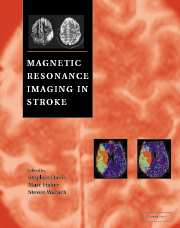Book contents
- Frontmatter
- Contents
- List of contributors
- Preface
- 1 The importance of specific diagnosis in stroke patient management
- 2 Limitations of current brain imaging modalities in stroke
- 3 Clinical efficacy of CT in acute cerebral ischemia
- 4 Computerized tomographic-based evaluation of cerebral blood flow
- 5 Technical introduction to MRI
- 6 Clinical use of standard MRI
- 7 MR angiography of the head and neck: basic principles and clinical applications
- 8 Stroke MRI in intracranial hemorrhage
- 9 Using diffusion-perfusion MRI in animal models for drug development
- 10 Localization of stroke syndromes using diffusion-weighted MR imaging (DWI)
- 11 MRI in transient ischemic attacks: clinical utility and insights into pathophysiology
- 12 Perfusion-weighted MRI in stroke
- 13 Perfusion imaging with arterial spin labelling
- 14 Clinical role of echoplanar MRI in stroke
- 15 The ischemic penumbra: the evolution of a concept
- 16 New MR techniques to select patients for thrombolysis in acute stroke
- 17 MRI as a tool in stroke drug development
- 18 Magnetic resonance spectroscopy in stroke
- 19 Functional MRI and stroke
- Index
- Plate Section
9 - Using diffusion-perfusion MRI in animal models for drug development
Published online by Cambridge University Press: 26 August 2009
- Frontmatter
- Contents
- List of contributors
- Preface
- 1 The importance of specific diagnosis in stroke patient management
- 2 Limitations of current brain imaging modalities in stroke
- 3 Clinical efficacy of CT in acute cerebral ischemia
- 4 Computerized tomographic-based evaluation of cerebral blood flow
- 5 Technical introduction to MRI
- 6 Clinical use of standard MRI
- 7 MR angiography of the head and neck: basic principles and clinical applications
- 8 Stroke MRI in intracranial hemorrhage
- 9 Using diffusion-perfusion MRI in animal models for drug development
- 10 Localization of stroke syndromes using diffusion-weighted MR imaging (DWI)
- 11 MRI in transient ischemic attacks: clinical utility and insights into pathophysiology
- 12 Perfusion-weighted MRI in stroke
- 13 Perfusion imaging with arterial spin labelling
- 14 Clinical role of echoplanar MRI in stroke
- 15 The ischemic penumbra: the evolution of a concept
- 16 New MR techniques to select patients for thrombolysis in acute stroke
- 17 MRI as a tool in stroke drug development
- 18 Magnetic resonance spectroscopy in stroke
- 19 Functional MRI and stroke
- Index
- Plate Section
Summary
Introduction
The development of therapies for acute ischemic stroke is a difficult venture with many potential pitfalls. Currently, the only approved therapy for acute ischemic stroke is intravenous tissue plasminogen activator (t-PA) given within 3 hours of stroke onset. The approval of rt-PA stemmed from the National Institutes of Neurological Disorders and Stroke (NINDS) trials that demonstrated a significant treatment effect with rt-PA on several different types of 90-day outcome measures and global assessment of these measures. Two other acute stroke therapy trials yielded statistically significant positive effects on the prespecified primary outcome measures. In the Stroke Therapy Ancrod Trial (STAT), ancrod, a defrinogenating agent, initiated within 3 hours of stroke onset improved outcome, but not as favorably as rt-PA given within the same time window. Another ancrod trial with a 6-hour window to the initiation of treatment was stopped and the drug has not been approved by regulatory agencies. The other positive acute stroke trial was the PROACT 2 trial that evaluated the thrombolytic agent, proUrokinase, within 6 hours of stroke onset in a group of relatively severe stroke patients with angiographically confirmed middle cerebral artery occlusion. The trial only included 180 patients and did not lead to regulatory approval. There have been a large number of other acute stroke therapy trials, both phase 2 and phase 3 trials that have not achieved a favourable outcome.
Keywords
- Type
- Chapter
- Information
- Magnetic Resonance Imaging in Stroke , pp. 113 - 120Publisher: Cambridge University PressPrint publication year: 2003

